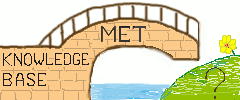|
||||||||||||

number of the work paper: (95-met-str)
Knowledge Base MET is information system,
developed as the hypertext for the World Wide Web.
The system presents the categories of special kind,
so called "metaphoric schemes".
Every metaphoric scheme is described as the system of the ideas.
The Knowledge base MET is not an AI programming system; this is the system of the descriptive texts, connected among themselves by the hypertext references. It intended purely for viewing through Internet or CD-ROM.
Knowledge base MET is developed on the basis of George Lakoff and Mark Johnson ideas speaking about a large role of metaphors in the human perception of a new complex situations.
The main entity in the Knowledge base МЕТ is a "metaphor" or "metaphoric scheme" (in [Lakoff 87] - "kinesthetic image schemata").
Metaphoric scheme - is the term,
(1) carrying a some simple abstract idea,
(2) having so many particular case in everyday life, that every man to adult age accumulates large experience of understanding and behaviour in the situations linked with the abstract idea.
Owning to the experience the metaphoric schemes are "the most understansable" categories, they play a role of a base knowledge units for understanding a new objects, phenomena, situations, and so on.
For each metaphoric scheme it is described in Knowledge base MET:
(#) Typical actions-heuristics, that may be applied in appropriate situation, which can play a role of advises.
The main entities of Knowledge base MET are metaphoric schemes and ideas of the (*), (#) kinds, or "metaphoring ideas".
Every metaphoric scheme has own name and be described in the single text (frame). The full list of metaphoric schemes (having description or only declared) one may to see in the text Collection of Metaphoric Schemes.
Every metaphoring idea linked to its own metahoric scheme and has own index in the frame of the metaphoric scheme. The idea is described or in short form - index, text of question or action, references to the metaphoric schemes linked with the idea (so called "postmetaphors"), or in full form - additionly presented the description of the idea, examples and other information. At the present time the most of metaphoring ideas is presented in short form.
The lists of metaphoring ideas – the lists of questions and actions have important value. It is the main meaningful part of the description of the metaphoric scheme. It is offered for potential user to look through the lists and to select that questions and actions that can give him new unexpected points of view for domain terms by which he worked, by which he links a some problems.
As metaphoring ideas are linked to metaphoric schemes, then by the mean of "metaphoric schemes" they are the ideas, that by the process of metaphoric transfer of meaning from metaphoric schemes to other entities, can have the maximally possible "market of using".
It is the main practical sense of the project. Presenting typical questions and typical actions linked to "the most undestandable" and wide using terms, Knowledge base MET offer to its users a some collection of typical ideas, ideas can be reffered, ideas can be used in the various problem situations.
Knowledge base MET is the variation of the "knowledge base", distingushed by:
(a) it hasn't the logical inference subsystem, the view of the knowledge base is the view of a hypertext,
(b) it oriented for knowledge of common kind, for knowledge that may be used in the very different situations,
(c) it integrated into the World-Wide Web: it is possible to refer directly from other texts presented in the World-Wide Web onto the ideas from Knowledge base MET.
In the given project the author was aimed to develop practically useful information system, which has shown the force and opportunities of the new scientific approach - "experientalism", offered by George Lakoff and described in [Lakoff, Lohnson 80], [Lakoff 87], [Johnson 87].
To the start of the file
Scientific report
The project in whole
About the author
About the IHPCS
e-mail: Leonid Ovanesbekov <olg@www.ivvs.ru>
References to the logical server are at: http://weblist.ru/, http://www.ru/.
1995 Sept 19 Tu -- 1998 Mar 03 Tu